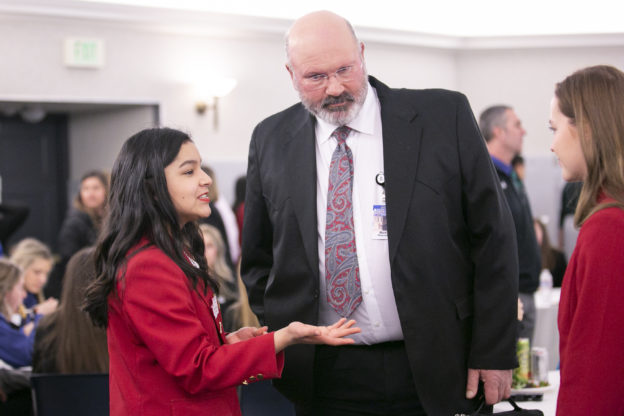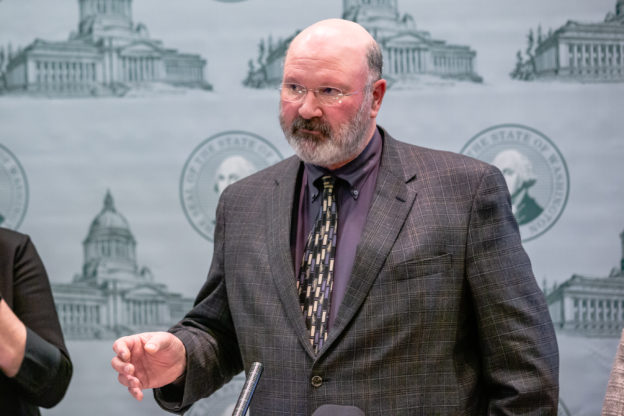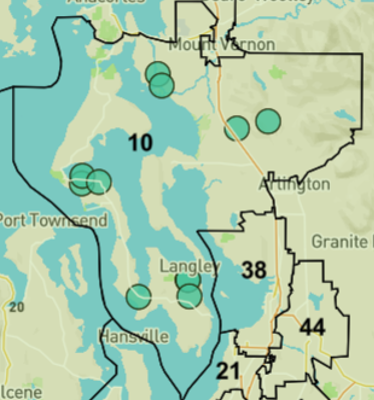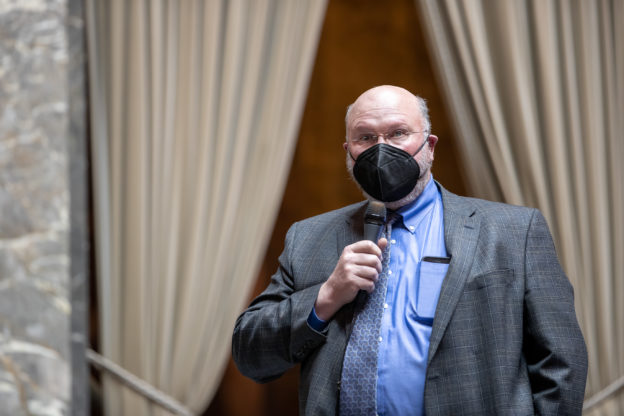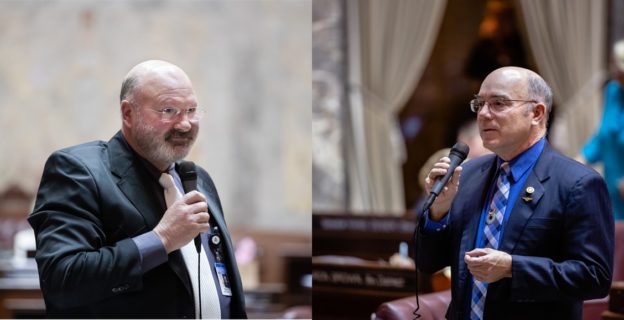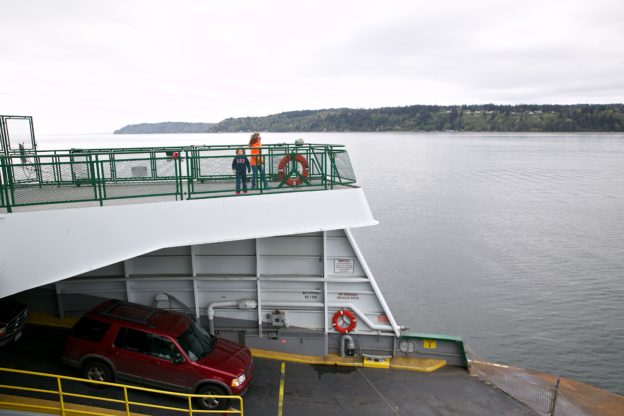 Greetings Friends, Greetings Friends,
We’re now past the halfway mark of the 2023 legislative session and things have been busy. There was a series of deadlines over last several weeks that have significantly cut down the number of legislative proposals that could eventually make it to the governor’s desk. Over the past few days, we’ve been working late into the evenings debating and voting on bills on the Senate floor. While some like to focus on varying political divisions, the reality is that the work in the state Legislature, especially in the Senate, features civil discussions about policies that seek to make life better or Washingtonians. Don’t get me wrong, there are some proposals that have or will come before me that are challenging. However, the lion’s share of bills we are voting on are overwhelmingly bipartisan. I’m pleased that several bills that I have sponsored have been approved by the state Senate this session. I have introduced proposals on issues ranging from fentanyl testing equipment to programs for Washington agricultural products, telemedicine and maternal health. 
|
Author Archives: Laudan
As seems to be the pattern with controversial and unpopular proposals, the legislative majority decided to pass Senate Bill 5599 late last night. If you haven’t been following, it’s legislation that purports to help at-risk youth suffering from mental distress, but in reality will only drive a wedge into hurting families. It’s a shame. During the committee hearings on the proposal, nearly 5,000 people signed in to testify in opposition, even organized groups from the LGBT community. That did not deter certain legislators. Please take a moment and watch my floor speech in opposition to this proposal.
While Democratic legislators advocate legislation that seems aimed at making Washington a destination for women seeking abortions, state Sen. Ron Muzzall has introduced two proposals aimed at aiding women who choose motherhood.
Senate Bill 5580 would direct the state Health Care Authority to support extended post-delivery hospital care for women struggling with substance-use disorders.
Senate Bill 5581 would require the state insurance commissioner to work with health-care providers toward strategies to lower if not eliminate deductibles for maternal-support services and postpartum care.
“The choice to end a pregnancy is not something I believe that women take lightly but there are all kinds of factors that go into that decision that I could never understand,” said Muzzall, R-Oak Harbor, who is assistant Republican leader on the Senate Health and Long Term Care Committee. “For women struggling that choose life, I want the state to provide support they need in motherhood. Reducing costs and providing maternal care is a strong start.”
On Tuesday, Democratic members on the health care-related committee endorsed Senate Joint Resolution 8202, which would amend the state constitution to cover the abortion rights established by Washington voters more than 30 years ago. Muzzall did not support the measure, saying there is absolutely no credible threat to abortion access, and therefore no need for another law.
“Unfortunately, I think the change in the constitution requested by Governor Inslee is more about performative politics than actually supporting women on an issue that has been long settled by the voters in our state,” Muzzall said. “My job is to represent my constituents and they have been clear that access to abortion is important. I stand by that. While my moral compass leads me to a different conclusion about life, I’m not going to demonize abortion or try to reduce access to abortion services, but it’s not something that I can personally support.”
Muzzall pushed back on Inslee’s description of those who disagree with the proposed amendment as “robbers.”
“No one is served by partisan name-calling over an emotionally charged issue. As a senator, I want to return civility in our political discourse. It’s a shame the governor won’t do the same. I think we can find common ground on the issue of abortion outside of the partisan heckling.
“There was a time not so long ago that we heard Democrats speak of reducing unintended pregnancies and making adoption more available and providing care and support for women who do carry their children to term. When did that become wrong? These bills would support women in ways that make choosing life the easier option. I can’t see why anyone would want to take that choice away.”
The abortion amendment was sent to the Senate Rules Committee, which will decide if it goes on the full Senate’s voting calendar.
The 2023 legislative session is underway, and the Senate Republican Caucus recently held internal elections for caucus leadership positions and finalized assignments to standing committees. State Sen. Ron Muzzall was re-elected as the vice-chair of the caucus.
Muzzall is tasked with helping preside at internal meetings of the caucus and coordinating committee activities as a liaison between leadership and committee chairs. Before being elected as vice caucus chair, Muzzall served as the deputy whip for the Senate Republicans.
“It is an honor to have earned my colleagues’ trust to help our caucus work effectively for the state of Washington,” said Muzzall, R-Oak-Harbor. “Over the past two years serving as vice chair, I think my fellow senators have seen a real value from me in this leadership position. It is a great honor for me personally, and a benefit to the communities in the 10th Legislative District.”
In addition, Muzzall’s committee assignments have changed, adding more responsibility to his plate and a greater voice for agricultural interests in the district. Muzzall will serve as the ranking Republican on the Senate’s Agriculture, Water and Natural Resources Committee.
He will continue on the Senate’s Health and Long Term Care Committee, but now as the assistant ranking member. He also will serve on the Senate Ways and Means Committee, which handles budget and taxation issues. Muzzall also retains his position on the influential Senate Rules Committee, which controls which bills come to the floor for a vote by the entire Senate.
“This session, I’ve opted to take on a fair deal of extra responsibilities for our district and the caucus,” Muzzall added. “As a farmer, I’ve never been afraid of hard work and with all of the critical issues facing our state, I’m excited to engage even more in the legislative process.”
Muzzall is a fourth-generation farmer on Whidbey Island. A graduate of Washington State University, he has been involved in numerous industry associations, county boards and committees, including the National Council of Farmer Cooperatives, Skagit Farmers Supply and Land O’Lakes cooperatives.
He served with North Whidbey Fire and Rescue for 20 years and as a fire commissioner for 11 years. Muzzall and his family own and operate a family farm, marketing their local products in the community. A lifelong member of Oak Harbor Lutheran Church, he served multiple terms on the church council and as council pesident.
The Legislature convened on Jan. 9 and will work for a total of 105 days to pass the state’s two-year operating budget and other legislation before its scheduled adjournment on April 23.
The day before the Legislature is scheduled to adjourn, the state’s updated construction budget was unanimously approved, providing over $3 million for projects around the 10th District. Sen. Ron Muzzall, R-Oak Harbor worked to collaboratively secure funding for critical community projects and other investments in affordable housing, infrastructure. and mental health capacity across Washington.
“The Capital Budget provides needed resources to our community that otherwise wouldn’t be available,” said Muzzall. “This budget is a lifeline for local governments and community organizations providing valuable services in our communities. It’s an area where the state can and should leverage its spending on long-term value for our schools, hospitals, public safety and more.”
Projects funded in the 10th District include:
- $100,000 for design and permitting of pump station modernization in Mount Vernon;
- $640,000 to the La Conner Library;
- $200,000 in safety improvements for the Island County Jail.
Ensuring a robust salmon recovery has become a daunting and politicized task.The latest proposal championed by the Office of the Governor is an example of the bad practice of creating more conflict rather than offering real solutions. The legislation amounts to an unethical taking of private property that will do nothing to aid salmon recovery, while allowing politically connected interests who are doing more harm to those efforts off the hook. The proposals also conflict with the Growth Management Act’s goals of preserving valuable farmland.
The bills working their way through the Legislature, Senate Bill 5727, SB 5665 and a House companion bill all have the same language with the stated goal of increasing riparian habitat. They operate under the faulty assumption that these buffers are the universal solution to increase salmon populations. Studies show, however, that other issues are likely having a more significant impact on salmon returns and riparian buffer zones are far removed from these causes.
It makes no sense to require property owners along the Skagit River to create and pay for large buffers of up to 200 feet on both side of a body of water. Failing to adhere to the onerous requirements in the legislation could mean significant financial penalties of $10,000 a day per instance of violation, according to the bill. Private property owners will be burdened with an extreme cost to achieve an ideological goal that will not help our salmon recovery efforts. It completely ignores the progress and outcomes of a voluntary stewardship program by those who call the Skagit River delta home.
There is a larger issue being ignored that could more immediately help salmon along the Skagit River. Namely, that Seattle City Light’s three dams along the Skagit River have no fish passages to allow spawning salmon to return home. An area tribe is currently suing the public entity over this issue and, incredibly, City Light continues to obfuscate and shirk the responsibility of having salmon recovery requirements imposed on their dams.
Rather than the government taking people’s property rights away, Seattle City Light could practice what they preach and build the infrastructure to help salmon get through their dams, opening approximately 40% of the river that is currently inaccessible for spawning. Putting the onus on private citizens, without any evidence that this approach will work while remaining silent about the complete inaccessibility of the watershed caused by Seattle City Light, is the height of hypocrisy. What is more, the governor’s proposed budget grants millions in state taxpayer money to City Light without any sideboards on how they should spend it to finally address the salmon passage issue.
Those whose lives and livelihoods are so intimately connected to the bounty the Skagit River provides know what they are doing. They’ve been doing it without the heavy hand of state government. Instead of acknowledgment and consultation they are met with contempt. Now more than ever, we need a rational, evidence-based approach to solve these issues so that we can have more salmon, not more conflict.
Paid family leave program running out of cash
There may be a COVID-baby boom, but expectant parents may be out of luck getting benefits they’ve paid for after news that the state agency managing the program is running out of money.
The Employment Security Department, responsible for collection of the taxes and payment of benefits, let legislators know late last week that the Paid Family Medical Leave fund will have a cash deficit by the end of March or April.
State Sen. Ron Muzzall, R-Oak Harbor, says more scrutiny is needed for high-profile agencies plagued by failures.
The fund, paid for with a payroll tax, provides new parents or people caring for sick loved ones a financial lifeline, but demand has outpaced supply despite the rate increasing at the beginning of 2022, and raising the tax rate again isn’t an option before the account goes in the red.
“I can’t say I’m shocked, but certainly frustrated with how this agency overseeing billions of tax dollars continues to fail people when they need it most,” said Muzzall, the Senate Republican Caucus vice chair. “Since joining the Senate, I’ve focused my efforts on nonpartisan issues of structure, discipline, and accountability – something sorely missing from how our state government functions for the people it serves. The pandemic has highlighted the need for more of that.”
Muzzall, who sits on committees providing oversight to various state social programs, points to repeated missteps at ESD over the nearly 700-day COVID-19 emergency. The agency came under fire near the beginning of the pandemic when out-of-work Washingtonians couldn’t receive unemployment benefits in a timely manner.
“This agency has been plagued by one failure after another and this is another example of some pretty disappointing mismanagement. I’m wondering when Washingtonians will be able to actually count on these costly programs,” said Muzzall. “There is a serious need for the Legislature to impose some strict accountability going forward.”
The agency simultaneously sent hundreds of millions of taxpayer dollars to overseas scammers. Adding insult to injury, ESD began cracking down on desperate unemployed workers who had been targets of identity theft. The Democratic megadonor overseeing the agency quit her post in state government to take a job in the Biden administration doing similar work.
ESD also had a hand in the rollout of the wildly unpopular WA Cares long-term care program, charged with processing exemptions only to be dogged by website crashes and lengthy delays.
In a presentation to legislators, ESD noted that only 40% of calls ever were answered, with an average wait time over an hour. Since increased staffing, those numbers have improved, with 70% of calls now reaching staff and wait times down to 14 minutes.
“The rosy picture painted about customer-service improvements is not in line with the reality what families in need are experiencing,” Muzzall added.
Tuesday afternoon, ESD announced a special, off-calendar meeting regarding trust fund projections. The agenda and how to join the meeting can be found by clicking here.
Ensuring the robust recovery of salmon has become a daunting and politicized task. The latest policy proposal championed by the Office of the Governor is facing sharp criticisms from Skagit County-area lawmakers who view it as an unconstitutional taking of private property that will do nothing to aid the salmon recovery while allowing politically connected interests that are doing more harm to salmon-recovery efforts off the hook. The governor’s solution directly conflicts with provisions of the Growth Management Act that require preservation of farmland.
Senate Bill 5727 and SB5665 are nonstarters for 10th District state Sen. Ron Muzzall and 39th District state Sen. Keith Wagoner, whose districts include parts of the Skagit River Basin. They argue that the proposal to require property owners along the Skagit River to create and pay for large buffers is an unethical land grab.
“If the policies in these bills are adopted, private-property owners will be burdened with an extreme cost to achieve an ideological goal that won’t help our salmon-recovery efforts,” said Muzzall, R-Oak Harbor. “It’s indefensible.”
Earlier this year, the state Department of Ecology moved to implement a policy that would have taken away livestock owners’ ability to water their livestock by requiring additional water rights. Similarly, this salmon recovery-related legislation seeks to take away private-property rights by requiring non-use of an estimated 200 feet of land on either side of a body of water.
Under the governor’s request legislation, new programs are established with onerous requirements for compensation to restore riparian habitat along targeted watersheds. Muzzall and Wagoner point to a larger issue being ignored that could more immediately help salmon along the Skagit River.
An area tribe is currently suing Seattle City Light over three dams it owns on the Skagit River that have no fish passages to allow spawning salmon to return home. The public entity has lobbied to stop salmon-recovery requirements from being imposed on their dams, including seeking exemptions from federal regulators.
“There is a simple solution here that doesn’t require a new, complex program modeled off an existing one that’s failing,” said Wagoner, R-Sedro-Woolley. “Rather than taking people’s property rights away, Seattle City Light could live by what they say and build the infrastructure to help salmon get through their dams; approximately 40% of the river is currently inaccessible for spawning.”
Currently, riparian lands are managed voluntarily under the Conservation Reserve Enhancement Program and by working forestland owners under the Forest and Fish program. Agriculture land and open space are regulated at the county level. The new bill removes local jurisdiction and gives enforcement authority to the state Department of Fish and Wildlife.
“Putting the onus on private citizens, without any evidence that this approach will work while remaining silent about the complete inaccessibility of the watershed caused by Seattle City Light, is the height of hypocrisy,” added Muzzall.
In the governor’s budget, Seattle City Light is to receive millions in state taxpayer money to finally address the salmon passage issue.
“The state is taking away land from farmers and other private citizens to give to a public entity that’s swimming in money, and the state taxpayers have to foot bill. It’s just plain wrong,” said Wagoner.
Greetings Friends and Neighbors,
As you know, many communities in the 10th District are heavily dependent on the state’s ferry system. Recent reductions in sailings, especially on the Clinton-Mukilteo route, have led to unacceptable disruptions of service. I am hearing the frustration from constituents and am looking for answers. That is why my seatmates and I are putting together this urgent virtual town hall. The Government Relations Director from the Washington State Ferries will be a guest and provide an update on what’s happening.
Our goal is to understand the current state of ferries situation, how we got here, and what the path back to normal service looks like. How long will it take? What is being done to mitigate the situation in the meantime? What is needed? How will restoration be prioritized?
Click here or on the image below to register. I hope that you can join us.











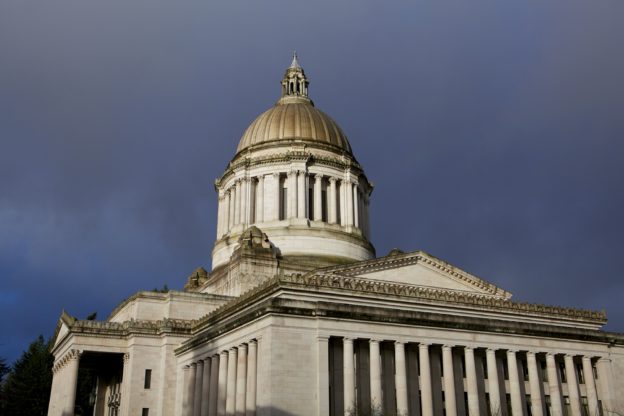
 Focus on health care
Focus on health care
 Supporting agriculture
Supporting agriculture
